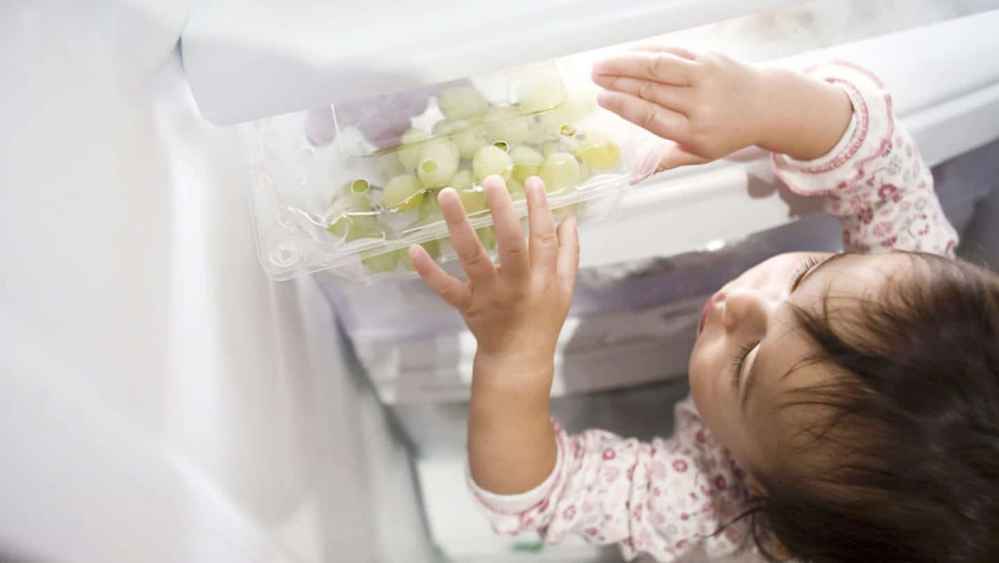While I usually suggest relaxing about most of it, I do know that paying attention to the foods that can be choking hazards for toddlers can alleviate a lot of stress–and potential issues at mealtime. Although I normally suggest relaxing, I know that paying close attention to foods that are choking hazards can help alleviate stress and potential problems at mealtime.
In our home, we used the baby-led method of weaning. I felt comfortable letting my daughters try new foods. It was obvious to me right from the beginning that some foods and textures are difficult for young children to handle. When my oldest daughter was 3 years old, she had a piece of tortilla chip get stuck in her throat due to the fact that she hadn’t chewed it properly. She didn’t actually choke, but was very uncomfortable and afraid. That was enough to make me more strict about toddler choking hazards.
Toddlers and food that can be choking hazards
Here are some common foods that could be problematic for young children, but can be prepared in a safer way.
When serving other foods, keep in mind your child’s chewing abilities and preferences. If your toddler is prone to stuffing food in their mouths at once, you may want to consider serving smaller portions of food to teach them to pace themselves.
- Hot dogs
The food could get stuck in the throat because it is round. Slice them lengthwise, then chop the pieces into smaller ones.
- Whole nuts
Almonds are difficult to chew, and some have sharp edges. Choose nut butters or seeds spread on lightly toasted toast or in oatmeal or smoothies.
- Whole grapes
To avoid the grapes getting stuck in your toddler’s throat cut them into quarters or halves (quarters if they are very large). This will make the pieces long, thin and easy to chew.
- Popcorn
It’s difficult to swallow popcorn that has been popped. For older toddlers that like crunch, rice cakes are a better option.
- Crunchy snack foods
You’ll have to use your judgement, but I’ve observed that toddlers younger than 2 can have difficulty chewing food with hard edges. This includes pretzels and crackers. When you can, choose softer versions and if in doubt, try one first. My own experience suggests that you wait to buy tortilla chips until they are at least 4 years old.
- Sticky foods
Avoid hard candy like gummy candies, taffy and gum. Straight spoonfuls are also included in this category, as they can be difficult for young toddlers to maneuver in their mouths. If your toddler prefers to eat nut butter with a spoon, you can thin it out a bit with water.
- Raw vegetables
It can be difficult for small children to chew raw foods such as celery, carrots, apple slices, and cucumber slices. If you want to keep your child safe, you can shred the carrots (try them shredded closer to 18 or 2 years of age), choose apples that are softer (like Gala), and slice them very thinly. You can also opt for lightly steamed versions or lightly cooked versions. Peeling cucumbers is also helpful. Cut them into long sticks or cubes, depending on the age of your toddler.
- Meat chunks
Even adults can find it difficult to chew thin or cube-shaped steak, chicken or turkey. Instead, try shredded or cooked ground meat.
Related: 10 first foods that are nutrient dense for babies
- Cheese chunks
This is something that I learned early because I have two children who love cheese. Shredded cheese is perfect for babies. Choose crumbled or very small pieces of cheese (about the size of peas).
- Bread
Bread cubes and sticks can easily get stuck in the roof of a child’s mouth until they are older than a year, or even closer to two years. Bread lightly toasted in small pieces is a good option. Cut foods such as pancakes and muffins in small cubes, too. And serve a beverage with them.
How to avoid choking a toddler during meals
Sit down with them at meals
Even if it’s not a family dinner, toddlers need to be watched while they eat. This is so that they learn proper table manners, as well as so that you can help them if they have difficulty eating. Eating while seated is a great way to reduce the risk of choking.
Before sending a food to a daycare, try it at home.
You want to be sure that they are comfortable with it before you do anything else. This way, you can give them your full attention.
Avoid feeding toddlers in the car food that may cause choking hazards.
Avoid giving food to children in the car. If possible, stick with soft foods they can handle.
Skip super crunchy foods for children under 3 years of age
Toddlers are often impatient and don’t chew their food thoroughly. Try to give them options. They will also do what they see adults or older siblings doing. Snap Pea Crisps are a great alternative to crunchy chips.
Follow your gut
Take the time to prepare something in a more safe way if you are worried. It doesn’t need to be a major undertaking, but some simple precautions will go a long ways.
